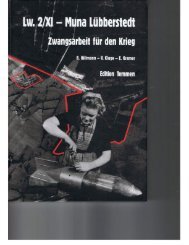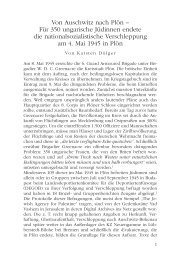The Kallos Family Book 2022
Always remember and tell the story to the world
Always remember and tell the story to the world
- TAGS
- barbara lorber
Create successful ePaper yourself
Turn your PDF publications into a flip-book with our unique Google optimized e-Paper software.
56 • THE KALLOS FAMILY
example would be the different pronunciation
between ‘sh’ and ‘sch’]. We also called her the
‘Tall Maria’. She was good-natured. On occasion
she told us that her hair was blonde by nature,
and it only changed to a red colour through the
influence of chemicals in the factory.
[end of page 7 of the original]
This might have been the case, because the
prisoners’ hair colour also changed over time due
to work in the factory. For distinction we called
a small, bowlegged, suspicious supervisor the
‘Little Maria’. She had unusually long thumbs,
like a monkey. She was approximately 27 years
old and spoke Polish fluently. She demanded
from her crew that they had to sing marching to
work. She was quite familiar with Jewish rites
and customs. She liked to hit girls in the face
whereby she turned her ring beforehand so that
it would tear up the facial skin of the beaten. I
estimate that the total number of supervisors
was 6. I do not remember the others.
The camp senior was Elsa, I believe, Hochmann.
She came from Transylvania, I think from
Cluj. She lives in Natanya.
[end of page 8 of the original]
There were no barrack seniors at Lübberstedt.
The largest crew numbered 230 women.
This crew was led by the ‘Red Maria’. This crew
worked on bomb manufacturing for the air force.
There was also a section for parachutes. Two
crews with 90 persons each worked in an explosives
plant closer to the camp. I worked in a crew
of those 90 women. We only worked in 2 shifts.
The ‘Little Maria’ led one of these crews. A small
group worked in the forest. Prisoners also had to
work in tailoring, in a cobbler’s shop, a kitchen
or a sick bay. Initially we had no doctor. One
of the female prisoners from Budapest, called
Guti Elisabeth, who had once studied 2 semesters
medicine, was given the function of camp
doctor. 2 nurses, who assisted her, were also not
qualified for this.
[end of page 9 of the original]
Only towards the end, two Ukrainian women,
professional nurses, and a young SS doctor were
brought in. I do not recall any details about their
identities. During the whole time the kitchen
was managed by the non-commissioned army
officer Franz Weigel. He did us no harm.
Some female prisoners were hurt from
wearing clogs. Women came to the sick bay
with infections. Before the closure of the camp
the SS doctor decided to remove the sick bay
in-patients from the camp. Approximately 20
women were transferred to an unknown place.
A compatriot called Berta Szabó, married name
Reismann, was taken away then. She did not
survive the war.
I recall that my compatriot, a young married
woman called Bistricer, died in the sick bay as a
consequence of maltreatment.
[end of page 10 of the original]
I cannot remember with clarity which of the
supervisors had maltreated Mrs Bistricer. I can
only restrict the period in which the incident
happened because I had seen the senior supervisor
Inge sitting next to the coachman in the
cart that carried the coffin. Only the sister of Mrs
Bistricer was allowed to accompany the dead
to the burial. Very vaguely I recall that another
fellow-sufferer was also fatally maltreated. She
passed away shortly after the maltreatment. I
was no eyewitness and am not able to recall the
name of the victim or of the culprit.
Approximately early April 1945 we were
loaded onto closed cattle wagons. We travelled
erratically. I recall Eutin station. We reached
Cuxhaven. Along the way airplanes attacked
our train. The train driver and one of our fellowsufferers
were killed.





